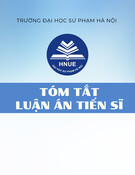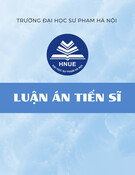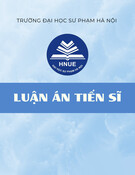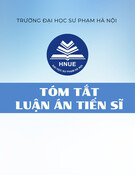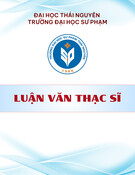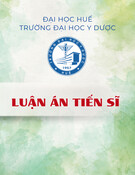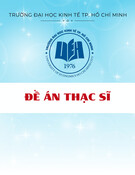MINISTRY OF NATIONAL DEFENSE
POLITICAL ACADEMY
VU THUY HOA PEDAGOGICAL COMMUNICATION SKILLS OF PRESCHOOL TEACHERS WITH KINDERGARTEN CHILDREN Major: Psychology
Code: 931 04 01
SUMMARY OF DOCTORAL DISSERTATION
OF PSYCHOLOGY
HANOI - 2018
THE DISSERTATION IS COMPLETED AT:
POLITICAL ACADEMY - MINISTRY OF NATIONAL DEFENSE
Scientific supervisor: 1. Assoc. Prof. Dr. Nguyen Van Tuan 2. Assoc. Prof. Dr. Truong Thi Khanh Ha
First PhD dissertation reviewer;: Second PhD dissertation reviewer: Third PhD dissertation reviewer:
This dissertation is defended by Academy Dissertaion Examination
Board, in accordance with the Decision No. ……… dated ……… of the
Director of Political Academy - Ministry of Defense. At: Political
Academy. At …… on the day of 2018.
The dissertation may be read at:
- National Library of Vietnam
- Military Library
- Library of Political Academy
LIST OF PUBLISHED SCIENTIFIC WORKS OF AUTHOR RELATED TO THE DISSERTATION
1. Vu Thuy Hoan (2016), "Developing pedagogical
communication skills for students of preschool education in Hanoi
Capital University", Journal of Science, No. 6, 2016.
2. Vu Thuy Hoan (2017), "Pedagogical communication skills
of preschool teachers with kindergarten children and evaluation
criteria", Journal of Education, No. 409, July, 2017.
3. Vu Thuy Hoan (2017), "Some measures to improve pedagogical
communication skills of preschool teachers with kindergarten children",
Journal of Education, No. 417, November, 2017
4. Vu Thuy Hoan (2017), "A number of subjective and
objective factors affecting pedagogical communication skills of
preschool teachers with kindergarten children", Journal of Science,
No. 21, 2017.
5. Vu Thuy Hoan (2017), "Skill of establishing relationship
with kindergarten children of preschool teachers", Journal of Social
Psychology, 10, 2017
6. Vu Thuy Hoan (2018), "Skills of exchanging information on
cognitive, affective and behavioral knowledge of preschool teachers
with kindergarten children", Journal of Social Psychology, No. 1, 2018.
1
INTRODUCTION
1. General overview of the dissertation Preschool teachers are carers, nurturers and educators of children from 3 months to 72 months of age at kindergartens in public, semi-public, people-founded and private schools. The goal of pedagogical work of preschool teachers is to help children in the development of physical, intellectual, emotional and social domains; form the first element of personality.
Kindergarten children are from 3 years old to 6 years old. They include 3-4 year old class, 4 - 5 year old class and 5 - 6 year old class. At this age, spoken language has developed and become the main means of communication of children but it is still limited. Their sentiment is in the stage of development and dominates the entire psychological life of the child; action thinking is predominant. In particular, kindergarten children are experiencing psychological crisis, with the conflicts that children have to overcome under the proper guidance of educators, that is the conflict between the self- made desire and limited ability; the need to work as adults and the prohibitions of adults. The psychological characteristics of kindergarten children are problems for kindergarten teachers, especially in the process of communication. In recent years, there has been a number of research studies on different aspects which in-depth study of kindergarten teacher theoretical and practical background with pre-school children. Based on the above reasons, the author chose the subject " Pedagogical communication skills of preschool teachers with kindergarten children ".
2. Research purpose and task of dissertation * Research purpose: The dissertation studies theoretical and practical issues in pedagogical communication skills of kindergarten teachers with kindergarten children and proposes psycho-pedagogical measures to improve pedagogical communication skills of preschool teachers. with kindergarten children.
* Research tasks The dissertation builds the
theoretical pedagogical communication skills of preschool kindergarten children; surveys and evaluates foundation of teachers with reality of the
2
pedagogical communication skills and factors affecting pedagogical communication skills of preschool teachers with kindergarten to enhance children; proposes psycho-pedagogical measures pedagogical communication skills of preschool teachers with kindergarten children; makes experiments to improve pedagogical communication skills of preschool teachers with kindergarten children.
3. The subject, object, scope of research and scientific hypothesis
* Research subject Expressions, levels and factors affecting communication skills of preschool teachers with kindergarten children. * Research object: Preschool teachers; kindergarten children; administrator of kindergarten.
* Scope of the research: Expression and level of pedagogical communication skills of preschool teachers with kindergarten children through "learning activities" of kindergarten children in kindergartens; Factors influencing pedagogical communication skills of preschool teachers with kindergarten children.
* Place of the research: In 5 kindergartens in Thai Nguyen province (19-5 kindergartens, Hop Thanh kindergarten, Phan Me kindergarten, Dong Dat Kindergarten, Du kindergarten) and 5 kindergartens in Hanoi City (Trung Van kindergarten, Dai Mo B kindergarten, Bach Dang kindergarten, the No.9 kindergarten, Viet - Trieu kindergarten) * Time of the research: The dissertation will conduct research from 2014 to 2017.
* Scientific hypothesis The pedagogical communication skills of school teachers with kindergarten children are now at an average level. There is a heterogeneity in the level between three groups of skills: skill of establishing relationships with children, communication skills in terms of perceptions, emotions, actions, and skill of using communication means, among them, the level of skill of establishing relationships with kindergarten children is minimal. The pedagogical communication skills of pre-school teachers with kindergarten children are influenced by subjective and objective factors such as:
3
through appropriate improvement and training, ...)
Perception of pedagogical communication skills; job passion, children love; professional experience of the teacher; psychological characteristics of kindergarten children; work environment and working conditions. If there are positive measures for the factors (such as the perceptions of teachers on pedagogical communication the skills pedagogical communication skills of preschool teachers will reach a higher level.
4. Methodology and research methods * Methodology The dissertation is based on the thorough understanding of the materialist dialectics of Marxist-Leninist philosophy, the Ho Chi Minh thought, the views of the Communist Party of Vietnam on education and educational management; At the same time, the application of approaches to the system - structure, history - logic, functional approach, supply - demand approach and practical approach to the research tasks of the identified subject.
Theoretical issues of pedagogical psychology in terms of skills, communication skills, pedagogical communication skills, kindergarten pedagogical communication skills. * Research methods Group methods of document researching: analysis, synthesis, generalization.
interview; in-depth
Group of research methodology: Questionnaire; observational methods; interview method; experienment; professional solution; Data analysis using mathematical statistics: Use SPSS 20.0 software to process survey data, surveys, experiments and display research results.
5. New contributions of the dissertation * Theorical contributions: The dissertation systematizes and develops some basic concepts such as communication skills, pedagogical communication skills, pedagogical communication skills of preschool teachers with kindergarten children.It also dentifies the expressions and levels of basic pedagogical communication skills of preschool teachers with kindergarten children, consisting of 3 groups of skills (establishing relationships with children, exchanging information of cognition and
4
affection, action; use of communication means) and factors affecting the formation and development of pedagogical communication skills of preschool teachers.
* Reality contribution: The dissertation the identifies
reality of pedagogical communication skills of preschool teachers with children which are expressed in 3 skill groups: establishing relationships with children; exchanging information on perceptions, emotions, actions; the use of communication means. The lowest level is the ability to establish relationships with the child, with the highest level being the skill group using the communication medium. In two groups of subjective and objective factors affecting the communication skills of preschool teachers with kindergarten, the subjective factors are the most influential.
Experimental results show that pedagogical communication skills for pedagogical teachers can be improved through pedagogical impact: training on pedagogical communication skills for preschool teachers with internal appropriate content, form and organization methods.
6. Theoretical, practical significances of the dissertation * Theoretical significances The results of this research will be document in the area of psychology and kindergarten pedagogy in both practice and theory in Vietnam.
* Practical significances The results of the dissertation contribute to the improvement of pedagogical communication of preschool teachers with kindergarten children, thereby well implementing the views of the Ministry of Education and Training on vocational training standards of preschool teacher. The dissertation is a useful reference for studies on pedagogical communication skills in general and teacher training and management in preschools in particular.
7. Structure of the dissertaion The dissertation includes introduction, four chapters (11 periods), conclusions, list of scientific works of the author related to the dissertation, list of references and appendices .
5
Chapter 1 OVERVIEW OF RESEARCH ISSUES RELATED TO DISSERTATION
1.1. Scientific works that related to dissertation 1.1.1. Scientific works of communication skill 1.1.1.1. Scientific works of communication skill in foreign coutries
Foreign authors study communication skills in many different directions, such as the technical study of communication skills, the study of the formation process, the study of communication skills such as the individual capacity. The authors have shown very specific communication skills which have highly applied in the training, implementation and evaluation. To acquire these skills, it requires performing capable of individuals and constant training.
1.1.1.2. Scientific works of communication skill in Vietnam In Vietnam, communication skills are studied in different directions. Through the research of the authors in the country, the problem of communication skills are Vietnamese authors study in various specific fields, when studying, each author has a personal opinions of concepts, structures as well as the process of forming communication skills of a particular activity. However, the above views do not contradict each other, but only exploit the problem in different aspects.
1.1.2. Scientific works of pedagogical communication skill 1.1.2.1. Scientific works of pedagogical communication skill in foreign countries foreign Studies by show
that pedagogical authors communication skills include many specific skills, expressed before, during and after pedagogical communication, specially the stage in the communication process. 1.1.2.2. Scientific works of pedagogical communication skill in Vietnam
In Vietnam, the authors have emphasized the process of developing skills, pedagogical communication skills that are a process that includes many skill groups, demonstrating the ability to apply knowledge and experience in delivery. Continuing to educate ourselves in order to quickly recognize the external manifestations
6
and internal psychological developments of the learner in order to establish a favorable relationship, and at the same time to use appropriate means of language, non-verbal language, organization, control the communication process in education to achieve the educational purpose.
1.2. Overview of research results of published scientific works related to dissertation and issues that need to be solved. 2.2.1. Overview of research results of published scientific works related to dissertation Psychologists have studied communication
identified
skills and pedagogical communication skills with a variety of approaches, in different fields and subjects. Both theoretical and practical studies have the concept of skills, communication skills, pedagogical communication skills; communication skills groups, pedagogical communication skills and its expression; factors affecting communication skills; at the same time, the path of formation, development of communication skills, pedagogical communication skills and effective use of skills in communication and pedagogy. These studies gave the author a comprehensive view of communication skills, pedagogical communication skills in world psychology. This will help the dissertation author to compare with studies on communication skills, pedagogical communication skills in the country and research direction of dissertation. 2.2.2. The issues that dissertation to be solved Researching the subject "Pedagogical communication skills of preschool teachers with kindergarten children", the author identifies issues that need to be solved: Firstly,
teachers the
the pedagogical communication skill study of preschool teachers with kindergarten children is considered the pedagogical communication skill as a process of multiple skill groups demonstrates the application of knowledge and experience in communication of to communicate, establish a relationship and use the means of communication to achieve the intended educational goals.
Secondly, it identifies basic pedagogical communication skills of preschool teachers with kindergaten children, including 3 groups: to exchange relationship building skills with children; skills
7
information on cognitive, affective and action with children; the skill of using the means of communication.
Thirdly, to study, investigate and evaluate the reality of teachers with pedagogical communication skills of preschool kindergarten children and the factors that affect them.
Fourthly, it identifies some psychological - pedagogical measures to improve the pedagogical communication skills of preschool teachers with kindergarten children. At the same time, it makes experienment on one of the proposed measures to prove that the use of the measure will improve the pedagogical communication skills of preschool teachers with kindergaten children.
Conclusion of Chapter 1
that pedagogical communication
In conclusion, the authors in Vietnam and in the world have shown skills, pedagogical communication skills of preschool teachers are processes which composed of many skill groups. It expresses the knowledge and experience in pedagogical communication skill to quickly identify the external manifestations and inner psychological behavior of the child to establish a positive and cohesive relationship, linguistic, non- linguistic, and organizational means of communication in order to achieve educational goals. The authors also divide the skill groups into pedagogical skills.
Chapter 2 THEORETICAL BASIC OF PEDAGOGICAL COMMUNICATION SKILLS OF PRESCHOOL TEACHERS WITH KINDERGARTEN CHILDREN
2.1. The basic concepts The concept of skill : Skill is the application of knowledge and experience of the individual to the effective implementation of actions / activities into the effective implementation of actions / activities in practical conditions.
The communication concepts: Communication is the establishment of relationships, exchanging information about cognitions, emotions, actions, and the use of means of communication among subjects under certain conditions.
8
The concepts of communication skills: Communication skills are the application of knowledge, experience of action/activity of an individual to the effective implementation of the relationship-building activities, the exchange of information about the perception , emotions, actions, and the use of means of communication among subjects under certain conditions. Pedagogical communication concepts:
Pedagogical communication is the act of establishing relationships, exchanging information about cognitions, emotions, actions, and the use of means of communication between teachers and learners. pedagogical concepts:
pedagogical Communication communication skills are the application of knowledge and experience of teacher action / activity to the effective implementation of relationship-building activities / activities, exchanging information on cognitive, affective, action and use of means of communicating with learners under certain conditions.
The concept of pedagogical communication of preschool teachers with kindergarten children: Communicative pedagogy of preschool teachers with kindergarten children is the establishment of relationships, exchanging information on cognitive, affective, and use of communication between teachers and kindergarten children.
The concept of pedagogical communication skills of preschool teachers with kindergarten teachers: the pedagogical communication skills of preschool teachers with kindergarten children is the application of knowledge and experience of activities / activities of preschool teachers to effectively implement relationships, exchange cognitive, affective and behavioral information and use of communication with preschool children under defined conditions to the development of comprehensive personality development for kindergarten children.
2.2. The basic pedagogical communication skills of preschool teachers with kindergarten children and evaluation criteria 2.2.1. The basic pedagogical communication skills of preschool teachers with kindergarten children Pedagogical communication skills of preschool teachers with kindergarten children include the following skill groups:
9
- Skill to establish relationships with kindergarten children: the use of knowledge and experience to show respect, sincerity of heart, understanding children psychology, love children to make children feel safe, reliable, fun, comfortable when they contact with teachers.
A group of skills that builds positive relationships with the child includes the following skills: skills to show good intentions, respect for children; skills to express the love of children;
- The skill of exchanging information on cognitive, affective and behavioral knowledge of preschool teachers with kindergarten children is the effective application of knowledge and experience in the exchange of information, emotional, action under the specified conditions.
The communication skills of exchanging cognition, affection and action include child-centered skills: communication skills in cognition; skills of exchanging information on emotions; skills of exchanging information on action.
- The skills of using communication means of preschool teachers with kindergarten children is the application of knowledge and experience in the implementation of actions / activities using spoken language, non-verbal gestures and toys, toys under certain conditions 2.2.2. Evaluation criteria of the pedagogical communication skills of preschool teachers with kindergarten children
The pedagogical communication skills of preschool teachers with kindergarten children are evaluated in five levels: Very low, low, medium, high, very high which based on 3 criteria: flexibility, sufficiency, matureness. In addition, we use the mean of the average scale in the questionnaire to evaluate. 2.3. The factors that effect the pedagogical communication skills of preschool teachers with kindergarten children
The pedagogical communication skills of preschool teachers is the special skill, the foundation that support to activity of preschool teachers when they are caring the kindergarten children.
10
The pedagogical communication skills of preschool teachers with kindergarten children are only bare psychological technical activities so they are effected by subjective factors (cognitions of preschool teacher on the pedagogical communication skills and psychological characteristics of kindergarten children; working experience, working passion, children loving; awareness of improvement of preschool teachers) and objective factors (psychological characteristics of preschool teachers; working environment and conditions; management style of the kindergarten managers)
Conclusion of Chapter 2
At present there are many concepts about skills, communication skills pedagogy. Through studying the above ideas, in this dissertation, we think:
1. The pedagogical communication skills of preschool teachers with kindergarten children is the application of knowledge and experience of the preschool teacher's actions/activities to effective relationship-building activities, exchange of implementation of information on perceptions of active emotions and use of means of communicating with kindergarten children under defined conditions, towards formation of comprehensive personality development for children. From there we study the pedagogical communication skills of preschool teachers with kindergarten children consisting of three basic skill groups: relationship building skills with children; skills to exchange information on cognition, sentiment, action; communication skills. Each include component skills, which are specific skill group will manifestations of pedagogical communication skills of preschool teachers with kindergarten children.
2. The pedagogical communication skills of preschool teachers with kindergarten children are influenced by many subjective and objective factors, including: Perception of preschool teachers on early childhood communication skills, psychological characteristics of preschool children; love of work, love of children; professional experience; awareness of nursing and training of preschool teachers; psychological characteristics of preschool children; environment, working conditions, management style of the administrator of the preschool.
11
Chapter 3 ORGANIZATION AND RESEARCH METHODOLOGY
3.1. Research organization Making surveys in 5 kindergartens in Hanoi, 5 kindergartens in Thai Nguyen province, including: 300 preschool teachers; 10 kindergarten children; 30 kindergarten administrators.
Time from 2014 to 2017. 3.2. Research methods In order to research the dissertation, we used a combination of various research methods, such as document research, questionnaire survey, observation, in-depth interview, group discussion, experts and methods of data processing in mathematical statistics through SPSS 20.0 software with statistical calculations: statistical analysis using descriptive statistics, analysis using statistical inference, factor analysis .
To assess the level of pedagogical communication skills of preschool teachers with kindergarten children, we used the 5 level scales of quantitative transfer from 1 to 5. Accordingly, the scale is 5 level (max) and minimum 1 level (min). Thus, of the levels will be in the range of 1≤ ≤ 5, the result will be calculated as follows:
Level 1 (Very low): 1.0 ≤ AM ≤ 1.8 Level 2 (Low): 1.8 < AM ≤ 2.6 Level 3 (Average): 2.6 < AM ≤ 3.4 Level 4 (High): 3.4 < AM ≤ 4.2 Level 5 (Very High): 4.2 < AM ≤ 5.0 To measure the factors affecting the pedagogical communication skills of preschool teachers, similarly, we divide the interval:
Not affected: 1.0 ≤ AM ≤ 1.8 Low impact: 1.80 < AM ≤ 2.6 Partial effect: 2.60 < AM ≤ 3.4 Influence: 3.40 < AM ≤ 4.2 Very influential: 4.20 < AM ≤ 5.0
Conclusion of Chapter 3
research, questionnaire surveys, The organization of the study is organized in a scientific and rigorous manner, with a combination of a variety of research in-depth methods: document is processed interviews, and specialized methods. The data
12
quantitatively, ensuring the reliability and scientific conclusions of the dissertation. These facilities allow the study to obtain the results of objectivity and scientific.
Chapter 4 STUDY RESULTS OF OF PEDAGOGICAL COMMUNICATION SKILLS OF PRESCHOOL TEACHERS WITH KINDERGARTEN CHILDREN 4.1. The practical situation of pedagogical communication skills of preschool teachers with kindergarten children 4.1.1. A general assessment of the reality of pedagogical communication skills of preschool teachers Table 4.1: Results of reality assessments of pedagogical communication skills of preschool teachers
GPA
Rank Level
Standard deviation
Average
Average
2,71 0,59 3
2,82 0,54 2
Average
Average
using of 1 2,96 0,50 Pedagogical communication skills Skills of establishing relationships with kindergarten children exchanging Skills of on information cognition, affection and action Skills communication means 2,83 0,54
Overall GPA The results of Table 4.1 show that the overall GPA of the three communication skills groups showed that the communication skills of preschool teachers with kindergarten children are at an average
level ( = 2,83). 4.1.2. The practical situation of pedagogical communication skills of preschool teachers with kindergarten children 4.1.2.1. Reality of relationship building skills with kindergarten children
13
Table 4.2: Level of skill of relationship building skills with kindergarten children
Level
Expressions
GPA
2,58
Standard deviation 0,67
Average
Low
2,93 0,44
Average Average
Skills to understand children psychology Skills demonstrate sincerity, good faith, respect for children Skill expresses love for children 2,63 2,71 0,65 0,59 Overall GPA
the standard deviation is 0.59. Thus, the
The results in Table 4.2 show that most preschool teachers perform skills in establishing relationships with kindergarten children at a low level. The average score for this skill group is 2.71, level of performance of this skill group only reaches the average of the scale. However, in terms of proportion, among the total number of study subjects (N = 300), 137 people (45.3%) of preschool teachers achieved good grades, 163 people (54.3%) of preschool teachers were inadequate lack of skills to establish a relationship with kindergarten children. 4.1.2.2. Reality of communication skills of cognitive, affective and action information
The results of the survey on the ability of cognitive, affective and behavioral communication skills of preschool teachers with kindergarten children are shown in the following table: Table 4.3: Levels of skills for exchanging information on perceptions, emotions, actions Expressions Level GPA Standard deviation
2,64 0,63 Average
2,79 0,53 Average
3,04 0,47 Average Skills of information exchange on cognition Skills of emotional information exchanging Skills of information exchange on the action
Average Overall GPA 2,82 0,54
14
The results of the study in Table 4.3 show that most preschool teachers do not yet achieve high levels of skills in cognitive, affective and affective communication. The overall GPA for this skill is 2.82, at an average of the whole scale (> 2.6 to 3.4). All of 300 surveyed subjects, only 106 preschool teachers accounted for 35.3% of the highs the level which was considered skilled; 194 teachers accounted for 64.7% in average the level which is considered to be not enough skills to exchange information about cognition, emotion, action.
In summary, the skills of communicating cognitive, affective and behavioral information of preschool teachers with kindergarten children are moderate and there is a level of heterogeneity in the composition skills groups. This finding suggests that there is a need for measures to improve this skill for preschool teachers, by exchanging cognitive, affective and behavioral information as one of the basic skills required for each teacher who takes care of the kindergarten children. 4.1.2.3. Reality of skills of using pedagogic communication means of preschool teachers with kindergarten children The reality of skills of using pedagogic communication means of preschool teachers with kindergarten children is shown in Table 4.4. Table 4.4: Level of using pedagogic communication means skill Expressions Level GPA Standard deviation
Speech language skills Skills of using behavior, gestures Skills of using toys Average Average Average Average 2,92 2,81 3,15 2,96 0,53 0,54 0,42 0,5
Overall GPA Table 4.4 shows that this is the best teacher performance in the three pedagogic communication skills groups, with a GPA of 2.96
= 2,96). This result shows that preschool teachers are very ( interested in this skill. This skill is derived from characteristics of preschool teachers, psychological characteristics of kindergarten children in general, preschool children in particular. However, the mean score for the communication skills group was only an average of the scale. Considering the composition skill groups, we found that
the skill group using toys had the highest average score = 3,15. Compared to the average of the skill groups, this group of teachers of
15
the kindergarten, although only reached the average of the scale but still higher than the other skill groups.
Thus, the ability to use the pedagogical media of preschool teachers with kindergarten children has the most effective results in the three skill groups that make pedagogical communication skills of preschool teachers with children but still only the average of the scale. This result is the basis for the proposed impact measure to improve this skill for preschool teachers. 4.1.3. Comparisons of the pedagogical communication variable of preschool teachers with kindergarten children 4.1.3.1. Comparison of the level of pedagogical communication skills of preschool teachers by training level Table 4.5. Comparison of the level of pedagogical communication skills of preschool teachers by training level
University N=134 College N=73 Pedagogical communication skills Vocational training N=93 GPA SD GPA SD GPA SD of relationship 2,79 0,55 2,70 0,59 2,63 0,63
of 3,01 0,49 2,85 0,56 2,60 0,58
using of 3,27 0,42 2,89 0,53 2,72 0,55 Skill establish Skill exchanging information on cognitive, affective and action Skill communication means 3,02 0,47 2,81 0,56 2,65 0,59
Overall GPA The obtained data showed a statistically significant difference 4.1.3.2. Comparison of the level of pedagogical communication skills of preschool teachers by seniority Table 4.6. Comparison of the level of pedagogical communication skills of preschool teachers by seniority - >10 - 20 20 Pedagogic
6 years N = 85 11 - >15 years N = 44 16 years N = 43 Over years N = 30 al communication skills
1 - > 5 years N = 98 GPA SD GPA SD GPA SD GPA SD GPA SD 2,47 0,70 2,58 0,65 2,62 0,58 2,83 0,51 3,05 0,49
Skill of relationship establish
16
2,60 0,62 2,65 0,56 2,74 0,55 2,95 0,50 3,16 0,47
2,71 0,56 2,78 0,53 2,91 0,52 3,13 0,49 3,27 0,40
Skill of exchanging information on cognitive, affective and action Skill of using communication means Overall GPA 2,59 0,63 2,67 0,58 2,76 0,55 2,97 0,50 3,16 0,45
The results shown in Table 4.6 show that seniority affects the communication skills of preschool teachers. To confirm this, we conduct One way anova test. The data obtained confirming that there is a relationship of seniority with pedagogical communication skills, that is, seniority has a certain impact on pedagogical communication skills of preschool teachers. 4.1.3.3. Comparison of the level of pedagogical communication skills of preschool teachers by area Table 4.7. Comparison of the level of pedagogical communication skills of preschool teachers by area Working area Skill groups
GPA
Ha Noi Thai Nguyen
2.60 2.56 2.58
2.94 2.92 2.93
Skills of establishing relationship with kindergarten children 2.61 2.65 2.63 Skills to understand children psychology Skills demonstrate sincerity, good faith, respect for children Skill expresses love for children 2.72 2.71 2.71
2.66 2.62 2.64
2.80 2.78 2.79 Skills of exchanging information on cognitive, affective and Group GPA Skills of information exchange on cognition Skills of emotional information exchanging
17
action
3.06 3.02 3.04
Skills of information exchange on the action Group GPA 2.81 2.90 2.82 2.92
2.82 2.80 2.81 Skills of using communication means 2.84 Speech language skills 2.94 Skills of using behavior, gestures Skills of using toys Group GPA 3.18 2.98 3.12 2.94 3.15 2.96
The results of the survey in Table 4.7 show that there is no significant difference in the average scores of the pedagogical communication skills groups of the pre-school teachers by area. 4.1.4. The correlation between pedagogical communication skills of preschool teachers
Table 4.8 shows that, with the significance level sig.(2-tailed) of the independent variables, p = 0.000 <0.01, it is concluded that 3 groups of skills are related and have statistical significance. Correlation coefficient (r) between variables is 0.718; 0.732 and 0.765 (very close to +1), indicating that the skills are closely related. Table 4.8: Correlation between skills (r)
Skills of exchanging information Skills of using communication means
Skills of establishing relationship with kindergarten children
1 0.765** 0.718**
0.000 0.000
300 300
0.765** 1 0.732** Skills of establishing relationship with kindergarten children Skills of exchanging information
0.000 0.000
Correlation coefficient Pearson (r) significance (p) Sample (N) 300 Correlation coefficient Pearson (r) significance (p) Sample (N) 300 300 300
18
0.718** 0.732** 1 Skills of using communication means
0.000 0.000
Correlation coefficient Pearson (r) significance (p) Sample (N) 300 300
**. Significance correlation (p) at level <0.01 . In summary, the above analysis can summarize comments on communication skills of pre-school teachers with kindergarten children is the average level. 4.2. The reality of factors affecting
the pedagogical communication skills of preschool teachers with kindergarten children 4.2.1. General assessment of the factors affecting the pedagogical communication skills of preschool teachers with kindergarten children Table 4.9: Assessment of factors affecting the pedagogical communication skills of preschool teachers
Affecting factors GPA SD
3,89 0,44
3,52 3,67 0,54 0,51
Subje ctive factor s 3,55 0,53 The perception of preschool teachers on pedagogical communication skills, psychology kindergarten children Professional experience Love of work, love of children Sense of self-training pedagogical communication skills Group GPA 3,66 0,51
3,50 0,56
3,59 0,50
Objec tive factor s 3,64 0,49 Psychological characteristics of kindergarten children Environment and working conditions Management style of kindergarten managers Group GPA 3,58 0,52
The results in Table 4.9 show that factors affect the teachers with pedagogical communication skills of preschool
kindergarten children. In which the subjective factor = 3,66 has a greater effect. The most influential subjective factor in pedagogical
19
communication skills of preschool teachers with kindergarten children is the cognitive element of preschool teachers in pedagogical
communication skills, kindergarten psychology = 3,89. The
element of love for working, love for children = 3,67 and sense of
self-training pedagogical communication skills = 3,55.
4.2.3. Correlation between factors influencing pedagogical communication skills of preschool teachers with kindergarten children
r = 0,79
r = 0,85
Cognition of preschool teachers
r = 0,76
Working experience
Subjective factors
r = 0,82
Love for working and children
r = 0,74
Awareness of self-training skills
The pedagogica l communica tion skills of preschool teachers
8 7 , 0 = r
r = 0,75
Children psychological characters
r = 0,78
Working condition and environment
Objective factors
r = 0,81
Management style of principal
r = 0,78
factors influencing teachers with Figure 4.1. Correlation between pedagogical communication skills of preschool kindergarten children
20
the correlation between factors
Observation in Figure 4.1 shows that there is a correlation between the groups of influencing factors. The above data also show influencing pedagogical that communication skills is uneven. The cognitive element and the element of love and affection for children in the subjective factor group have a higher correlation coefficient, which has a stronger influence, in which factors most affect communication skills of pedagogy. Preschool teachers are the cognitive element of preschool teachers, and later to the element of love for children
4.3. Psychological and pedagogical measures to improve pedagogical communication skills of preschool teachers with kindergarten children
4.3.1. Raising awareness and fostering regular pedagogical skills for students in the pre-school education sector; 4.3.2. Organizing annual training courses on communication skills for preschool teachers; 4.3.3. To build up a positive and healthy pedagogical culture in kindergartens; 4.3.4. To be active in self- learning, self-motivation training of preschool teachers.
4.4. Analysis of experimental results 4.4.1. Previous and post-experimental results Experimental results of fostering pedagogical communication skills through training basic theoretical knowledge on pedagogical communication skills and pedagogical situations have shown that Positive changes are shown in Table 4.10 and Figure 4.6: Table 4.10: Previous and post-experimental results
Before experiment After No Pedagogical communication skills
1 GPA 2.69 SD 0.63 experiment GPA 3.68 SD 0.51
2 2.80 0.58 3.73 0.50
3 2.93 0.55 3.81 0.48
Skill of relationship establish Skill of exchanging information on cognitive, affective and action Skill of using communication means Overall GPA 2.81 0.59 3.74 0.50
21
1st skill group: Skill of relationship establish 2nd skill group: Skill of exchanging information on cognitive, affective and action
3nd skill group: Skill of using communication means Diagram 4.6: The pedagogical communication skills of preschool teachers with kindergarten children previous and post- experiment
Comparison of pairs of samples of all three pedagogic communication skills of kindergarten teachers with kindergarten children, with a significance level of sig. = 0.000 <0.05, this difference value is statistically significant. The pre-test average score
for this skill was = 2.81 (average), after the third experiment had
= 3.74 (high), the difference between before and an increase of after the pedagogical impact was 0.93 .
Because P <0.05, there is a statistically significant difference when comparing the first pair with the third r = 0.83 and P = 0.000, so we have the basis for confirming the mean Communicative pedagogy of preschool teachers with pre-and post-experimental infants is different.
4.4.2. Some experience after experiment analysis As a result of the experiment, we can comment that the impact measures used in this dissertation are suitable for preschool teachers.
22
Through teacher training, communication skills training teachers have changed significantly. Pedagogical communication skills have improved markedly. Most of preschool teachers get at high level and very high level. There are not teachers at very low and low levels, the average level is reduced. Thus, through training the preschool teachers can improve their understanding of how to conduct pedagogical communication skills, to fully implement, master and flexible delivery skills.
Conclusion of chapter 4
is better. The
Communication skills of preschool teachers are average, in the pedagogical communication skills group, the group of skills to level of establish relationships with children pedagogical communication skills of preschool teachers with kindergarten children differs between educational level and seniority. There are many influencing factors affecting the pedagogical skills of early childhood teachers, in which cognitive factors have the most influence on their pedagogical communication skills; element of working love, children love; environment and working conditions have a certain impact on pedagogical communication skills of preschool teachers. The results of the pedagogical impact test showed that when the teacher was trained, the results have improved markedly.
CONCLUSIONS AND RECOMMENDATIONS
1. Conclusion The communicative skills of preschool is
teachers with the application of knowledge and kindergarten children experiences of preschool to effectively establish teachers relationships and exchanging information on emotional awareness, action and using the means of communication with kindergarten children under certain conditions. It is an important skill, however, the research results show that the level of performance of this skill in
23
the new teachers is only at an average level ( = 2,83), the majority of preschool teachers have not paid attention in improving this skill for yourself. The lowest performance was the ability to establish
relationships with children ( = 2,71); ranked second was the skill
of cognitive, affective and affective communication ( = 2,82); The
self-improvement.
highest was the communication skill group ( = 2,96). The research results also show that there are two groups of factors that influence the pedagogical communication skills of preschool teachers with preschoolers, including the subjective factors and the objective factors. The most important influence on communication skills of preschool teachers. Experimental results suggest that pedagogic teachers' communication skills can be improved through appropriate pedagogical measures. This asserts that empirical direction is appropriate and feasible. The research results are consistent with the hypothesis of the dissertation. 2. Recommendations * Preschool teachers It is necessary to be aware of their responsibilities and professional values with the care of pre-school education in general and preschool education in particular, thereby creating motivation for In all aspects, ceaseless self-study and improvement of pedagogical communication skills with kindergarten children; regularly practice character traits suitable for preschool age, passionately devoted to nurturing and caring for children, in order to help children develop and improve their personality and attain the goal of preschool education. * Kindergartens It is necessary to study the program of fostering preschool teachers, constantly improving all levels, focusing on fostering pedagogical communication skills with kindergarten children. Focusing on facilities, equipment, teaching aids requires interaction
24
between teachers and children and between children and young people to develop more skills for her and her children. Help preschool teachers adopt the best teaching methods for their children. It is necessary to balance the classes to suit the kindergarten age, create space suitable for children play together with creating conditions for preschool teachers to study and improve their professional qualifications. To adopt policies to encourage teachers to work in the preschool industry, to better ensure the material and spiritual life of preschool teachers with peace of mind and work for the cause of planting people.
* Pre-school teacher training schools It is necessary to research and develop the pedagogical communication skills training program for preschool teachers in a fully, reasonably and scientific manner. To attach importance to equipping teachers with professional practice for preschool teachers, equipping them with necessary soft skills for teaching activities through regular pedagogical training activities at schools. Facilitate regular access to children to develop communication skills from the beginning of the course through hands-on training at preschools. To have reasonable policies and remuneration to attract high school students with good academic performance, good at studying preschool such as scholarships and work placement after graduation.

